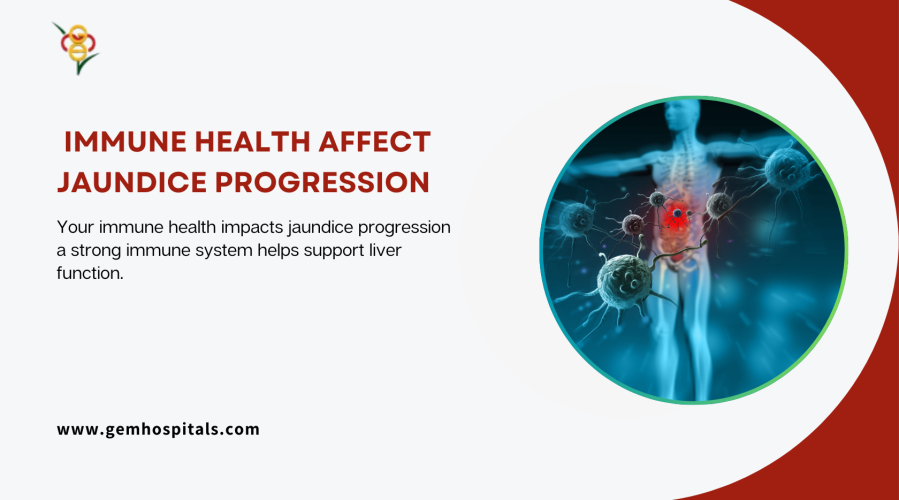Learn effective solutions for digestive problems with expert tips to improve gut health, reduce discomfort, and maintain a healthy digestive system.
How Does Immune Health Affect Jaundice Progression?

Jaundice is a disease which is characterized by the pigmentation of skin and the sclera of the eyes. This yellow colouration is due to bilirubin, a pigment that is formed when the body processes red blood cells. Normally, bilirubin is removed from the blood by the liver. However, if there are problems with this process, jaundice may occur. Jaundice has many causes, but immunity is central to the progression and the recovery processes.
It is important to establish the relationship between immune health and jaundice. Infections are likely to prolong the duration of jaundice if the immune system is weak, but a healthy immune system may help the body fight off jaundice. This blog will discuss the different types of jaundice and how immune health determines the progression of jaundice and how to boost the immune system during the recovery process.
Understanding Jaundice and Its Types
More to the point, jaundice is not an illness but rather a sign of other diseases. It may affect infants, children and adults; the causes may include liver diseases, infections, and obstructive diseases of the bile ducts. Jaundice generally falls into three categories:
- Pre-Hepatic Jaundice
This type is precipitated by conditions that lead to increased red blood cell turnover and hence elevated bilirubin levels. However, the liver cannot metabolize the bilirubin at the same rate as it is produced, when the liver is still functioning normally. Some of the common ones include: Hemolytic anemia and malaria. - Hepatic Jaundice
Hepatic jaundice is caused by liver related diseases, hepatitis, cirrhosis and other liver diseases. In this case, the liver is unable to clear bilirubin from the bloodstream adequately because it is inflamed, scarred or infected. - Post-Hepatic Jaundice
This type is also called obstructive jaundice because it occurs because of the obstruction in the bile ducts and thus bilirubin cannot be expelled from the liver. Tumors or strictures in the bile ducts or gallstones obstructing the bile ducts are the common causes of post hepatic jaundice.
Different types of jaundice call for different treatment, though, the immune system plays a major role in the body’s ability to handle and heal from it.
Effects of Compromised Immune Health on Jaundice Progression
Any form of immunosuppression may hinder the body’s ability to fight the disease and also the ability to heal from the condition. Here are some of the ways that compromised immunity can affect jaundice:
- Reduced Liver Function
A compromised immune system may not be able to help maintain the liver at its optimal best. During low immunity, the liver activity is reduced, and the body has a challenge in breaking and eliminating bilirubin. This can prolong the disease and increase the severity of the symptoms, especially jaundice. - Increased Vulnerability to Infections
Immune system disorders raise the susceptibility to infections, and these can worsen jaundice, particularly in cases of hepatic jaundice. For instance, people with jaundice resulting from hepatitis are likely to contract other liver infections, which will worsen the liver’s condition. - Delayed Recovery
If the body has a weak immune system, then it takes time for the body to recover fully. This means that, in cases of jaundice, symptoms such as fatigue, yellowing may take longer to disappear because the immune system is preoccupied with supporting the liver and dealing with any cause of jaundice.
Immune Health and Recovery from Jaundice
On the other hand, a healthy immune system will enable the body to get rid of the disease and get rid of jaundice within the shortest time possible. When the immune system is strong, then the body can control the level of bilirubin and support liver function. Here’s how a robust immune system can contribute to faster recovery:
- Enhanced Liver Repair
A good immunity is crucial because the liver can regain its normal function once the patient has hepatic jaundice. The immune system also helps the liver in metabolizing bilirubin, which consequently reduces the symptoms of jaundice. - Reduced Risk of Complications
He or she should avoid getting sick with diseases or other conditions that can worsen the condition of jaundice. The immune system acts as a shield which avoids infections that would otherwise exert pressure on the liver to filter bilirubin besides managing infections. - Better Management of Inflammation
In conditions like hepatitis inflammation is usually an issue and a healthy immune system can help in managing inflammation and reduce pressure on the liver, thus reversing the jaundice condition.
Strategies to Support Immune Health for Jaundice Management
Blogs & Article
Explore current research trends in digestive health, including new treatments, advanced diagnostics, and innovations improving gut health and patient care.
Discover common digestive health myths and the real facts. Learn simple tips to improve gut health and maintain better digestion for a healthier life.


